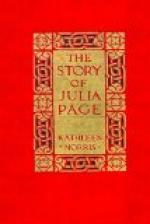“Miss Toland will marry,” Julia submitted.
“Perhaps she will,” her aunt said. “Perhaps, again, she won’t. But at all events, it’s a rather flat business, all this rushing about to dinners and dances; it’ll last a few years perhaps—then what? I tell you what, my dear, there’s only one good thing in this world, and that’s work—self-expression. It hurts my pride every time I see a nice girl growing older year after year, idle, expensive, waiting for some man to miraculously happen along and take her out of it. I tell you the interesting lives are those of people who’ve had to work up from the bottom. A working girl may have her troubles, but they’re real. Why, let’s suppose that Barbara marries, that she marries the man her mother has picked out, for example, still she doesn’t get away from the tiring, the sickening conventions that all her set has laid down for her! I wish I had my own girlhood to live over—I know that!” finished the older woman, with a gloomy nod.
“Miss Toland seems to me to have everything in the world,” Julia said, in childish protest. “She’s—she’s beautiful, and every one loves her. She’s always been rich enough to do what she pleased, and go places, and wear what she liked! And—and”—Julia’s eyes watered suddenly—” and she’s a lady,” she added unsteadily. “She’s always been told how to do things, she’s—she’s different from—from girls who have had no chances, who—”
Her voice thickened, speech became too difficult, and she stopped, looking down at her teacup through a blur of tears. Miss Toland watched her for a silent moment or two; despite all her oddities, no woman who ever lived had a kinder heart or a keener insight than Anna Toland. It was in a very winning tone that she presently said:
“Tell me a little something about yourself, Miss Page!”
“Oh, there’s nothing interesting about me!” Julia said, ashamed of showing emotion. She jumped up, and began to put the kitchen in order. But the recital came, nevertheless, beginning with Chester, and ending with Julia’s earliest memories of the O’Farrell Street house. The girl tumbled it out regardless of sequence, and revealing far more than she knew. Julia told of the episode of Carter Hazzard; she repeated the conversation she had overheard at the club.
Miss Toland did not once interrupt her; she listened in an appreciative silence. They washed and put away the dishes, straightened the kitchen, and finally found themselves standing in the reception room, Julia still talking.
“.... so you see why it sounds so funny to me, your talking about your niece,” Julia said. “Because she—she seems to me such miles ahead—she seems to have everything I would like to have!” She paused, and then said awkwardly: “I’ll never be a lady, I know that. I—I wish I had a chance to be!”
And she sat down at the little Mission table, and flung her arms out before her, her face tired and wretched, her blue eyes dark with pain. Miss Toland’s face, from showing mere indulgent interest, took on a sharper look. She was a quick-witted woman, and this chanced to touch her in a sensitive spot.




